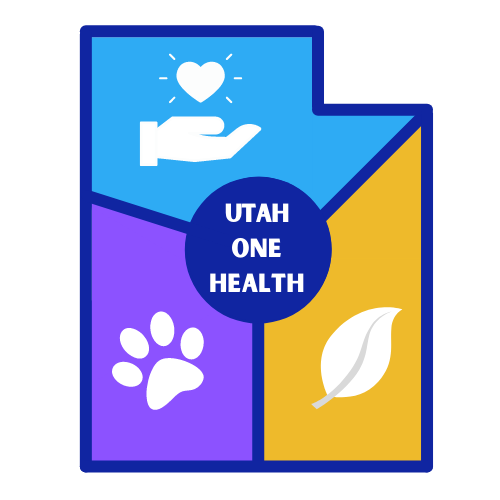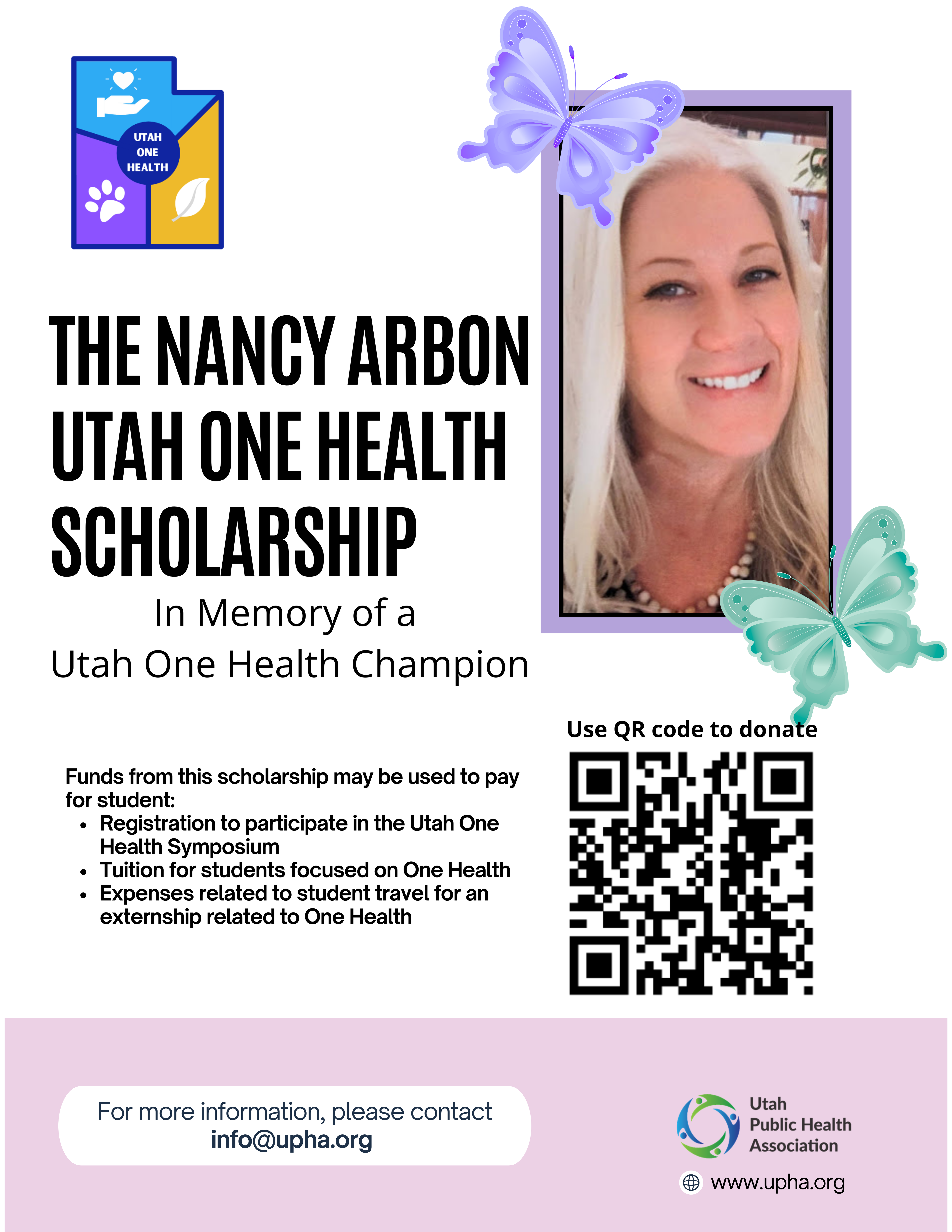One Health in Utah
One Health is a collaborative approach to promoting the interconnected health of humans, animals, and our shared environment.
The One Health concept recognizes:
- The link between the health of humans, animals, and our shared environment
- The need for multidisciplinary collaboration to solve interconnected health challenges
- One Health vaccination clinic: Utah's first large-scale One Health vaccination clinic was a big success! The clinic was hosted by the Tooele County Health Department in Grantsville on October 26, 2024 and allowed pets and their people to be vaccinated in a single location, offering a convenient option for the whole family. See this LinkedIn post by our Utah State Public Health Veterinarian for more information about this event.
- Collaborative response to zoonotic influenza: Since 2022, animal and human health partners in Utah have worked together to respond to highly pathogenic avian influenza outbreaks in wildlife, domestic poultry, and dairy cattle. In addition to zoonotic concerns, these outbreaks highlighted the need to connect agricultural communities with health resources. In April 2025, partners finalized 2 agreements to facilitate rapid collaborative response to zoonotic influenza and other One Health concerns:
- West Nile virus (WNV): State health officials, local health departments, the Utah Public Health Lab, local mosquito abatement districts, blood donor organizations, Utah’s Hogle Zoo, and Tracy Aviary meet routinely to discuss control of WNV, a mosquito-borne virus that can affect both humans and animals. Read more about WNV prevention and response in the WNV annual reports.
- Collaborative tick surveillance: State health officials are developing and expanding partnerships with local health agencies, the Department of Wildlife Resources, local mosquito abatement districts, other One Health partners, and the public to conduct tick surveillance across the state. Anyone who wants to submit a tick to contribute to our surveillance efforts should fill out the Utah tick submission form.
- Q fever: Utah One Health partners routinely investigate sheep, goat, and human cases of Q fever, a bacterial disease that can be spread from livestock to people.
- Raw milk outbreaks: State and local health officials routinely work together to investigate gastrointestinal illness outbreaks associated with raw milk and raw milk products. The Utah Department of Agriculture and Food published a webpage for consumers and raw milk producers in 2025 that includes a list of permitted raw milk dairies in Utah, information about routine testing of raw milk, and an outline of the outbreak investigation process. Check it out at rawmilk.utah.gov.
- Harmful algal bloom (HAB) surveillance: Every summer, the Division of Water Quality (DWQ) works with state and local partners to conduct routine surveillance for HABs in many water bodies across the state. State health officials partner with the Utah Poison Control Center to investigate any human illnesses associated with HABs. Recently, DHHS partnered with DWQ, NPS, and local veterinarians to create resources for animal owners and veterinarians with the goal to improve surveillance for animal illnesses and deaths associated with HABs in Utah and prevent illness in the first place.
- Tularemia outbreak: Utah state one health epidemiologists worked with local health departments, Division of Wildlife Resources, Division of Water Quality, and the CDC to investigate a tularemia outbreak among beavers across multiple jurisdictions. This investigation included water testing, tick drags, public education, and media engagement and required communication between many agencies. This effort highlights the importance and strength of multidisciplinary collaboration between partners to address the health of humans, animals, and the environment.
- SARS-CoV-2 at the human-animal-environment (HAE) interface: Utah has participated in various SARS-CoV-2 outbreak investigations and surveillance projects at the HAE interface. Visit our SARS-CoV-2 One Health page to learn more about SARS-CoV-2 One Health projects in Utah.
- Secondary water safety: Some kids in Utah got sick with E. coli O157:H7 in summer 2023 after playing in or drinking untreated, pressurized, municipal irrigation water (secondary water). In response, many health and water partners worked together to post a webpage to help educate the public and prevent illness. Check it out at SecondaryWaterSafety.utah.gov.
- Assessing pet rabies vaccination: State and local health officials collaborated to pilot a survey in Tooele, UT to assess the rabies vaccination coverage in cats and dogs. In collaboration with local animal control entities and other partners, the goal of the project is to promote pet rabies vaccination in selected communities.
- Salmonella in backyard poultry (BYP): Utah health officials collaborated with the CDC, the Utah Department of Agriculture and Food, the Utah Veterinary Diagnostic Laboratory, and partners in other states to sample baby chick shipping material and test it for Salmonella. This project helped identify and respond to outbreaks of illness linked to BYP and support prevention efforts at chick suppliers.
- Salmonella in a bearded dragon: State and local health officials identified Salmonella in a pet bearded dragon, which provided the clue needed to solve a multistate outbreak of human salmonellosis.
- Thallium in beef: After routine sampling of Utah beef identified potentially harmful levels of thallium, officials from various human, animal, and environmental health agencies collaborated on an investigation to characterize the public health and environmental threat.
- Corynebacterium ulcerans in humans and pets: State and local public health officials and environmental specialists worked together to conduct human, animal, and environmental sampling for Corynebacterium ulcerans in a Utah household.
Here are some infectious diseases that affect both humans and animals:
- Anthrax
- Avian influenza or Novel influenza
- Babesiosis
- Brucellosis
- Chagas disease
- Dengue
- Hantavirus
- Leptospirosis
- Lyme disease
- Mycobacteriosis (non-TB)
- Nipah virus
- Plague
- Psittacosis
- Q Fever
- Rabies
- Rocky Mountain spotted fever
- Salmonellosis
- Trichinellosis
- Tularemia
- West Nile virus
Environmental health concerns that affect humans and animals:
- Environmental contaminants:
- Harmful algal blooms in water bodies
- Drought and the shrinking of the Great Salt Lake
- Air pollution
- Coccidioides in humans and pets
- Flexible, unpaid practicum opportunities
Partners in the Utah One Health Network
Associations/groups:
- Utah Veterinary Medical Association ( UVMA )
- Utah Public Health Association ( UPHA )
- Utah Environmental Health Association ( UEHA )
- Utah Association of Local Health Departments ( UALHD )
- Utah Mosquito Abatement Association ( UMAA )
- Utah Rapid Response Team ( URRT )
- Utah Poison Control Center (UPCC)
Healthcare:
- Veterinarians and veterinary medical clinics
- Human healthcare providers and systems
Universities:
- Utah State University ( USU ), Extension One Health
- Westminster College, Great Salt Lake Institute
Local government:
- Local health departments
- Mosquito abatement districts
- Animal control jurisdictions
State government:
- Utah Department of Health and Human Services ( DHHS )
- Utah Department of Agriculture and Food ( UDAF )
- Utah Department of Environmental Quality ( UDEQ )
- Utah Division of Wildlife Resources ( UDWR )
- Utah Division of Water Resources ( UDWRe )
- Utah Division of Emergency Management (UDEM), Be Ready Utah
Federal government:
- Centers for Disease Control and Prevention (CDC), One Health Office
- USDA Animal and Plant Health Inspection Service Veterinary Services (APHIS VS), One Health
- USDA Food Safety and Inspection Service ( FSIS )
- Food and Drug Administration ( FDA )
- National Park Service ( NPS )
- US Geological Survey, National Wildlife Health Center ( USGS NWHC )
- US Fish and Wildlife Service ( USFWS )
- Indian Health Service ( IHS )
- Urban Indian Organization
Tribal government:
- Tribal health departments
- Tribal mosquito abatement districts
- Tribal animal control jurisdictions
Other entities
To learn more about One Health in Utah, email [email protected].
Nancy Arbon played a key role in establishing the annual Utah One Health Symposium. Nancy earned a degree in Environmental Science from the University of Utah. She worked for many years at the Utah Public Health Laboratory as the customer relations manager, as well as in the Toxicology lab and, most recently, as the Antimicrobial Resistance Laboratory Network coordinator. Nancy was an essential part of the public health laboratory and was instrumental in establishing the Utah One Health Symposium, previously the Rabies Consortium.
Nancy tragically passed away on October 2, 2024. Her friends on the planning committee of the Utah One Health Symposium established this scholarship to memorialize Nancy and help ensure the continuation of her legacy of compassion, service, dedication to students, and passion for One Health. Nancy was foundational in establishing the Utah One Health Symposium and is a Utah One Health pioneer.
She is greatly missed. We’ve created this scholarship to honor her work as a Utah One Health pioneer.
Eligibility and use:
Students who are enrolled in a university or college in Utah and who are pursuing studies related to One Health are eligible to apply.
Students may use funds from this scholarship to pay for:
- Registration to participate in the Utah One Health Symposium
- Tuition for students focused on One Health
- Expenses related to student travel for an externship related to One Health
Application:
Application coming soon.
Student selection:
Student recipients of this scholarship will be decided by the Utah Public Health Association in consultation with the Utah One Health Symposium planning committee.
Fund management:
Funds in this scholarship will be managed by the Utah Public Health Association in consultation with the Utah One Health Symposium planning committee.
Donation:
This scholarship is funded by donations. People or organizations can donate through UPHA here: https://buy.stripe.com/4gw2aGc6L4UEbsY8wx
